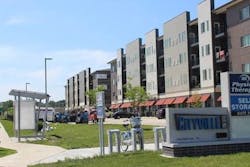IA: DART and Des Moines Bicycle Collective Open Region’s First Mobility Hubs
The Des Moines Regional Transit Authority and the Des Moines Bicycle Collective recently opened four mobility hubs in the city of Des Moines. Two additional hubs will be opening in the near future. The mobility hubs provide access to two forms of transportation, DART bus service and the Des Moines Bicycle Collective’s BCycle stations, at one location. The first hub was installed in July 2017 and is located downtown on SW 9th Street in Hubbell Realty Company’s Cityville community.
Funding
While Hubbell Realty Company funded the first mobility hub in Des Moines, the remaining hubs and another three standalone BCycle stations were funded through the federal Transportation Alternatives Program (TAP) grant. DART submitted an application for the TAP grant through the Des Moines Area Metropolitan Planning Organization (MPO) in partnership with the Des Moines Bicycle Collective. The grant was used to help fund the purchase of the BCycle stations, the new bus shelters and the installation of both the stations and shelters at each location.
Where to find them:
The mobility hubs mark the first multimodal transit stops in the city of Des Moines. The hubs are located:
- 30th Street and Carpenter Avenue (Drake neighborhood, Route 5)
- 24th Street and University Avenue (Drake neighborhood, Routes 3 and 60)
- 19th Street and Cottage Grove Avenue (near Smokey Row Coffee Co., Route 14)
- SW 9th Street (Cityville funded by Hubbell Realty Company, Route 7)
- 17th Street (near Meredith Corporation, Routes 11, 60 and D-Line), opening in August 2017
- Ingersoll Avenue and 23rd Street (Routes 11 and 60), opening late summer/fall 2017
DART and the Des Moines Bicycle Collective also used TAP grant funding to install three additional BCycle stations in Des Moines. The following locations do not include a DART bus shelter:
- Forest Avenue and 27th Street (Drake neighborhood)
- 33rd Street and Forest Avenue (Drake neighborhood)
- 3rd Street and Market Street (Science Center of Iowa)
Community Impact
“We often hear from our riders and others in the community that they are looking for more transportation options. Riding the bus and bicycling complement each other, and incorporating both into one location will be a great asset to the community,” said DART Chief Engagement and Communications Officer, Amanda Wanke.
Many DART riders rely on bicycling as a transportation option. In the last year, nearly 59,500 riders used the bike racks on the front of DART’s buses, which is a 240 percent increase in use from 2007. All DART buses are equipped with bike racks that can accommodate two bikes at a time. Although BCycle bikes do not fit in the bike racks on DART buses, commuters who ride the bus to work can use BCycle bikes to run errands or grab lunch during the day.
Several area businesses partner with either DART or the Des Moines Bicycle Collective, or both organizations, to cover the cost of rides for one or either of the services for their employees and students. “It’s important that we develop our relationships with businesses and organizations,” said the Executive Director of the Des Moines Bicycle Collective, Jeremy Lewis. “These relationships show that our community is making alternate modes of transportation a priority for the future as the metro continues to grow.”
"The new mobility hubs at Drake provide additional opportunities for our students to quickly and conveniently connect with all of the benefits that the city of Des Moines has to offer, including internships, employment, entertainment, and volunteerism,” said Jerry Parker, dean of students at Drake University. “These flexible transportation options are particularly useful as fewer students bring cars to campus, and an increasing number of faculty and staff members pursue alternate transportation methods as well.”


